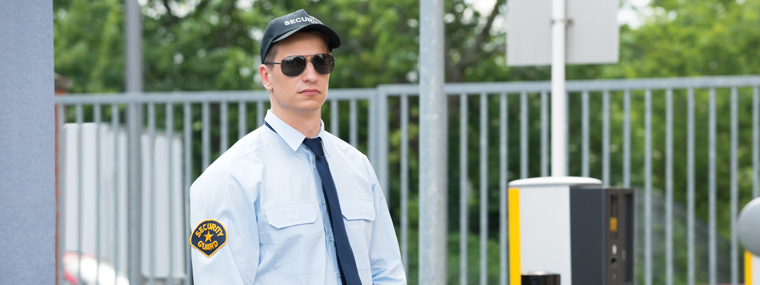
What to Consider When Hiring Security Guards for Your Property
By Mark Westbrook / Published September 2020

When it comes to your property’s life safety and security, the ultimate goal is to show your tenants that protection and prevention are your top concerns. There are many ways to protect your property and tenants and deter crime. Having a physical presence to guard your property could be a good idea if you have the budget for it, but it should by no means be your only strategy. Consider a security guard as part of a well-planned mix with emergency communications technology.
A human security guard may discourage crime if the guards you choose are well trained and competent. With that said, choosing an effective security guard requires a combination of knowledge and trusting your gut as well as putting other essential complementary measures in place, such as your emergency communications system, in order to reduce crime and prevent emergencies.
Keeping all that in mind, we’ve listed a few guidelines below to use when seeking a uniformed security guard for your property.
Human security guards can be costly
Security guards often work on an hourly wage, and, as it goes in business, you often get what you pay for. There are two ways to pay your security guards: either personally or through the company they work for. The company then pays the guard a percentage of your fee.
[adrotate group=”1″]
Don’t immediately go with the lowest-priced guard. Low price may also mean poor quality performance and may lack the best or most robust service options.
Is the security company you’re considering licensed and insured?
Be sure to review the company’s license and insurance details. Their insurance coverage should be able to cover your defense in court if needed. “A reputable insurance agency should have liability coverage of $1 million per occurrence, $3 million aggregate, and $2 million umbrella coverage. They should also have auto liability and workmans’ compensation coverage,” according to protectedbytrust.com.
Security guards are not cops
Security guards don’t hold the same authority as municipal or state police (unless you have hired off-duty police officers as security), but they can issue a private person’s arrest, most likely for trespassing. This arrest gets transferred to the local police department for further action. It’s important to have other safety tactics to back up your security guards in the event of an emergency, such as an emergency action plan and emergency help phones.
Have a specific goal in mind for having a security guard on the property
Don’t leave any situation to chance. Your number one security priority should be crime prevention. Make sure your security team practices prevention techniques that stop future crime. Otherwise, the security you hire could be prone to mistakes and misunderstandings. That can result in lawsuits.
Be clear about a security guard’s job responsibilities
You may have a mental picture of a security guard standing in your lobby or sitting behind a desk, but some professionals monitor video or specialize in watching for shoplifters or loiterers. Some can also be trusted to open and close a property at the beginning or end of the day. Be sure you’re in sync with the guard about what you’re expecting and not expecting.
Security guards are only human
The security guard business has been known to have high turnover. This means that lesser qualified people may sometimes slip through the hiring process. When the demand is higher than the supply, you want to be sure that you are getting the very highest quality guard.
Speaking of video surveillance, even if you choose to go this route, there are blind spots when it comes to video monitoring, and human error makes it impossible to guarantee that your security guards will catch every occurrence on your property that may need attention. It’s important not to rely on them as the end-all be-all for keeping your property safe.
Look for candidates who have previous security or law-enforcement experience. These types of officers may be more costly but may also bring you more peace of mind.
Be sure that the security company you hire has 24/7/365 customer service
Make certain that your security company has a hotline staffed by customer service professionals who can help you in a pinch or emergency. If the company only has after-hour voicemail or returns calls the next day, move on. Try calling in the evening and see who picks up (or doesn’t). Find out how long it takes for someone to return your phone call. Only consider companies that can talk to you live 24/7/365.
Security guards can double as customer service representatives for your property
If a guard is sitting at a front desk, he or she can act as a gateway to your property. This could mean that the guard interacts with clients, customers, and tenants; answers questions; and can give directions and locations. A guard may be able to escort customers and employees to their cars at night. This shows that you care about your people and that security is a top priority.
Security guards can monitor the status of your security equipment and report trouble
Part of the job of a security officer is to make sure that your electronic and digital security equipment remains in working order. This can include checking up on sensors, cameras, and motion detectors. You can ask the guard to report any trouble to you so that the problem is addressed immediately.
Who will back up or replace your security guard?
Who will cover the shift if the guard you’re expecting does not show up? And will you be happy with the replacement? If you are choosing a security company, ask them how they handle emergency replacements.
Make sure your guard is licensed to carry a weapon
Your guard must be properly licensed as a security guard. If you desire armed guards in particular, that will require additional licensing.
Be sure to rely on an emergency communications service for additional protection
Security guards are a very hands-on approach to your building’s life safety. They create an atmosphere of high security and add elements of authority, supervision, and human judgment. However, as we have mentioned, they aren’t enough on their own. In fact, when guards are on duty, property managers and tenants alike can develop an inflated sense of security. As we’ve mentioned above, there are some shortcomings that come with security guards, including building blind spots as well as the potential for human limitations and errors.
If you have your emergency elevator phones currently ringing to your security guards, you should keep in mind the following:
- Sometimes, they are the entrapped party or the very person needing help.
- They are sometimes unavailable to take the call.
- They are not properly trained to handle all emergency calls (for instance, some emergency calls require pre-arrival medical instructions until help arrives).
- You are missing out on key benefits of a specialized monitoring partner (call recording, location and elevator cab ID, language translation, etc.).
It’s important to supplement your security guards with additional safety methods to minimize the margin for error. With or without a human security guard, never be without a professional emergency response service for your emergency phones. Seek out professional trained operators who are on standby 24/7/365 to help with any emergency on your property, including elevators, pools, stairwells, garages, parking lots, and other places that security guards’ eyes can’t reach. An emergency phone is always there, even when a security guard is not, so that you and your tenants have peace of mind and fast response.
Mark Westbrook
Southeastern Regional Business Development Manager, Kings III Emergency Communications
Mark Westbrook serves as the Southeastern Regional Business Development Manager. Mark brings with him more than 30 years of sales and service management in the life-safety industry. This experience has helped him succeed in developing a team that is one of the top experts in the emergency communications services in the Southeastern region. Mr. Westbrook was born and raised in Georgia but has made his home in the Tampa Bay Area for the last 30 years. For more information on Kings III, call (833) 807-2890 or visit kingsiii.com.




